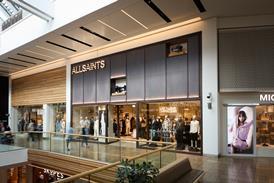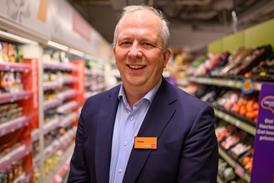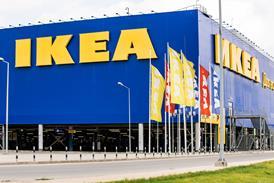
Ian Middleton
Former musician, general layabout and eventually retailer for 30 years (and counting)
Built a national jewellery store chain starting in 1994 ending up with multiple stores on high streets and in major shopping malls. Eventually sold all the physical stores by 2015.
Now trading mainly online but also a writer, speaker and consultant on things retail related as well as trying to be an ethical entrepreneur.
Still running retail businesses but with more of an eye on how to balance consumerism with sustainability and business with morality. Not sure if that's possible, but it's a work in progress.
Also involved in Green politics and campaigning for small businesses and independent retailers. Stood for Parliament 3 times. Lost 3 times. Now sit on 3 local councils, one of which owns a huge shopping centre. Now there's a turn up!
I tend to comment and tweet a lot, not always with a straight face. I can be found @IanMiddletonX
124 comments By Ian Middleton
Not really sure what "investing £500m" means. Does this mean they'll take a £500m hit on their profits? In which case the term 'investment' is a bit odd.
Or does it mean they'll lean on their suppliers to take the hit and use the £500m for marketing and some spot reductions.
It all sounds very good but the devil would seem to be in the detailTotally agree Steve. Part of the reason I dipped my toe nervously into politics is to try to embed these principles into governmental thinking. There needs to be a cultural shift in retailer behaviour to match that of consumers.
Local and national government can play a big part in that as well as helping to keep physical retail spaces alive. But this all has to be done from the position of authority on the subject. Sadly, much of my experience of council involvement in retail so far has demonstrated naivety and a lack of understanding of the issues. There are some bright spots though!I've suggested several formats in past columns and there are many other analysts out there who have come up with some great ideas. Unfortunately a short column doesn't give me the space to elaborate on those sorts of ideas.
Perhaps we need a conference where all sides could contribute ideas and hammer out a way forward, as long as that included invitations to retailers at all levels as well as landlords, agents and others involved in the whole physical retail prospect.
I've been to several such conferences, but the problem is that they are usually limited to the same faces and the same organisations. What we need are ideas and discussion on a much broader scale from right across the retail spectrum.Thanks Fiona, That's encouraging on one level but not so much on another.
I'm thinking of those large units, especially in shopping centres that are likely to become relics for some time. Designed around the idea of one or more massive anchor stores, they generally don't lend themselves to being subdivided with any real purpose. I think the days of the anchor store are over, leaving many large developments stuck with a format that is no longer fit for purpose.
In terms of smaller retailers, the reset of rents is good news as long as this isn't just a temporary thing. We once had temporary lets, then we had pop-ups, and now the latest buzz-term is 'meanwhile uses'. None of this solves the problem in the long term.
We need lease structures and rental expectations that allow small retailers to flourish without constantly having to look over their shoulder waiting for the next rent review or lease renewal. This is especially the case in areas that smaller outfits often revitalise only to be kicked out a few years later when the area is on the up and being stalked by those with deeper pockets.
In short, we need a return to the days when landlords valued the use of a unit and the stability of a properly run and well established business, as well as the clientele that the business attracted.
Having fallen foul of over ambitious and frankly avaricious letting agents in the past myself, I know how damaging that behaviour has been over the years. It's resulted in something of a monoculture of big payers and big names on a homogenous high street, mostly all on borrowed money.
We now see how easily that can unwind when circumstances and market forces change direction.Only £30m?? That's surely small change to a man who owns multiple personal assets with at least one yacht worth over £100m.
Green has always been a chancer and this is just him taking advantage of a crisis to walk away from the mess he's created. His only real success story has been Topshop and that really had very little to do with him.
He's the perfect example of a Trump style businessman, claiming credit for successes that were either blind luck or down to others who he subsequently jettisoned.
Yet again we're about to see thousands of employees facing ruin while the man responsible walks away to sun himself in Monaco.
This really is not the image of retail we want to promote and I hope we've seen the last of people like this.
The one silver lining I can see is that hopefully we can all stop talking about this odious little parasite on the backside of our industry.A little from column A.
A little from column B.Oh hang on.....they did! :)
I'm just saying that when you pull a fast one (justified or not) don't try to make out it's about 'restructuring' when it's obviously not. They know it's not, we know it's not, and the landlords know it's not.
In common parlance the phrase is don't **** on my shoes and tell me it's raining!
As for standing up for the landlords, I'm not crying any crocodile tears, and I think they probably should have bitten the bullet and re-negotiated. But for their part, JD have taken GO into locations where they simply don't belong, and they should be prepared to pay the price for that.
If they wanted to turn it into Blacks they should have just bought Blacks. And look where that ended up!I also love how JD are trying to paint the repayment of 'indebtedness' to the parent company as some kind of honourable settlement.
That's an accounting exercise, not a grand ethical gesture!
JD could have just written off the debts if they wanted to. It pretty much amounts to the same thing unless there's some other convolutions in their finance arrangements with lenders.
All a bit grubby though, isn't it?Have to say I can't see a hell of a lot of 're-structuring' going on. Everything appears to be same as it ever was. The only difference is that they now have leverage in negotiations with landlords.
I thought the pre-pack was largely dead, but this is a slick move by a company who I think got well out of their depth. JD just wanted an outdoors brand and instead of embracing the quirkiness of GO they simply applied the same branding and merchandising processes as every other outdoors store.
I've always like GO, but what made them special was diluted when they were acquired by JD. They no longer seem to have a point of difference, unless you include the faux discount card, an idea that should have been retired years ago and now actually puts me off shopping there.
Many of their earlier stores were cheap and cheerful affairs in off-prime locations that other operators would never have looked at. Could these 'inflexible leases' be the new shiny stores they opened recently? If so it's hardly surprising that the landlords were intransigent.
Perhaps, now they have the opportunity, it's time for JD to take GO back to their roots.Was that a typo in the headline? Surely you mean Bullsh*ts?
I hope they've warned air traffic control about that squadron of flying porkers that will soon be circling over Westminster
We had huge problems in the early 2000s recruiting decent staff. Then the eastern EU countries got freedom of movement and all of a sudden we had a supply chain of eager, articulate (yes in English) and reliable people who didn't see shop work as beneath them.
I fear we may very easily slip back to the bad old days if these ridiculous dog-whistle policies are enacted.Some good points and I agree that at this stage we need to accentuate the positives.
But given the timescale we have to deal with climate change is 10 years, not the 20 years that Sainsbury's is working towards, and certainly not the 30 years the government has set, we do need to step it up a gear.
There is still quite a lot of selective focus on these issues, for example the quote referring to "wild caught salmon". Those figures might be impressive but what about (sorry!) farmed salmon? That tends to be much more environmentally damaging and serves the cheaper end of the market, so is probably much more likely to be the bulk of their sales.
Yes what-about-ery can be quite churlish, but it also shows that we're mostly dealing with tip of the iceberg issues here, when we should already be well below the water-line. I've said in previous columns, the consumer is becoming quite savvy about all these issues, and they won't be fobbed off with a piecemeal approach for long.
I don't doubt Sainsbury's has a genuine engagement with the issues (after all any retailer ignoring climate change now isn't going to last long), but there is an element of trade-off in all of this. Doing the things that are easy or cheap won't solve the broader problems we face. It has to be root and branch, and there aren't many companies who are prepared to go that far unless they see a real commercial advantage.
As you say, that has to be led by consumer demand, but retailers also have to get ahead of that curve. Although as you rightly point out, many consumers may talk the talk but then walk the walk in cut-price clothes that could never lay any serious claim to sustainability or, in many cases, ethicality.
It's a massive minefield, but it's one we have to navigate fully as retailers and consumers to avoid irreversible damage to the planet and our businesses.As I've said many times in the past, the problem is that retail is a disparate business covering large areas of the country but with a low density in terms of jobs and market share. This means that in simple terms it has very little political capital.
The belief from government is that individual towns and regions can cope with these jobs losses on a case by case basis and that another retailer will always arise to fill the available space. Of course those of us in the industry know that's not the case and the cumulative effect of all these losses has long been taking its toll as a whole.
When you add in the impact of the internet on physical retail and other factors like the uncertainty of Brexit, lack of town centre vision and in burden of other taxes and overheads, not least VAT, the minimum/living wage, pension obligations, rising fuel costs and a plethora of other pressures, it's not surprising so many big names are now turning up their toes.
The difference in the future is that there will be far fewer new companies eager to fill those spaces for the same reasons.
I've long thought we're well beyond a reform of business rates now. We need positive government intervention on things like rent levels, local infrastructure management, transport and other issues that can, and do, have a direct impact on retail and other businesses.
The problem is that most politicians at all levels of government just don't understand how retail works. Certainly people like Grant Shapps have absolutely no idea, as we saw during his dubious tenure as minister for the high street.
Yet another promise of yet another business rates reform is far too little, far too late, especially as we all know that it will go exactly the same as all the other promised reforms.
Business rates are just too much of an easy buck for government, and while they refuse to accept taxation like this should take into account the ability of any business to pay it, we'll never get out from under this rock.Well I suppose this makes a change from the usual annual PR fluff from Amazon about delivery by drone. Now Ocado are looking to steal the crown for the most pointless bit of innovation with driverless delivery vans.
Presumably they will incorporate some kind of trebuchet which will launch your parcel from the kerbside and deliver it through your front window attached to a brick wrapped in a note saying "have a nice day!".
In other news, my company will be looking beyond our previous trials of delivery by Star Trek transporter and moving to our next exciting development featuring fulfilment by telekinesis.
We don't rule out delivery by quantum entanglement using a special new minority report style predictive ordering system, which will mean shipments will arrive with you 2 months before you place the order.Interesting that quite a few of these predictions are targetted at green issues. Probably not surprising though as the world's attention rightly turns to climate change. Consumers are no different.
As for RFID coming of age, I'll believe it when I see it.I've been saying this for years. CVAs seem like a great solution to your problems when you're at your lowest ebb, but they really just put off the evil moment.
Unless you have really dealt with the systemic problems in your business and can service legacy debts in the long run as well as day to day running costs and the costs of running the CVA it's nothing more than a sticking plaster.
In most cases if you could do all that you wouldn't need a CVA in the first place!Yes, but just how sustainable is 'sustainable cotton' and how ethical is ethical?
Ultimately, there is no way you can sell clothes at the prices Primark charge that are sustainably and ethically produced. The idea that fast fashion, 'disposable' clothing can be sustainable is a joke in itself.
Primark may be engaging on the subject of ethics, but they're really only one exposé away from another damaging scandal aren't they?"Totally true story"?
Is it?
If not I predict something of another backlash along the lines of that awful WW1 advert.




































Commented on: 2022-05-30T07:42:39.613
Sainsbury’s commits to £500m price investment as customer concerns grow